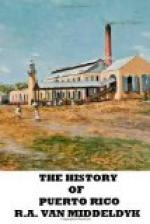The Directors’ report of January, 1897, was even more gloomy. They complain of the want of interest in their proceedings on the part of many of the leading commercial houses, of the lamentable condition of commerce, of the inattention of their “mother,” Spain, to the plausible pretentions of this her daughter, animated though she was by the most fervent patriotism.
FOOTNOTES:
[Footnote 74: Rafael Conty, subdelegate of the treasury of Aguadilla, sailed round the island in a sloop in 1790 and confiscated eleven vessels engaged in smuggling.]
[Footnote 75: For commercial statistics of Puerto Rico from 1813 to 1864, see Senor Acosta’s interesting notes to Chapter XXVIII of Abbad’s history.]
[Footnote 76: Vide Resena del Estado Social, Economico e Industrial de la Isla de Puerto Rico por el Dr. Cayetano Coll y Toste, 1899.]
CHAPTER XXXV
EDUCATION IN PUERTO RICO
In Chapter XXIII of this history we gave an extract from his Excellency Alexander O’Reilly’s report to King Charles IV, wherein, referring to the intellectual status of the inhabitants of Puerto Rico in 1765, he informs his Majesty that there were only two schools in the whole island and that, outside of the capital and San German, few knew how to read.
In the mother country, at that period, even primary instruction was very deficient. It remained so for a long time. As late as 1838 reading, writing, and arithmetic only were taught in the best public schools of Spain. The other branches of knowledge, such as geography, history, physics, chemistry, natural history, could be studied in a few ecclesiastical educational establishments.[77] The illiteracy of the inhabitants of this, the least important of Spain’s conquered provinces, was therefore but natural, seeing that the conquerors who had settled in it belonged to the most ignorant classes of an illiterate country in an illiterate age. Something was done in Puerto Rico by the Dominican and Franciscan friars in the way of preparatory training for ecclesiastical callings. They taught Latin and philosophy to a limited number of youths; the bishop himself gave regular instruction in Latin.
A few youths, whose parents could afford it, were sent to the universities of Caracas and Santo Domingo, where some of them distinguished themselves by their aptitude for study. One of these, afterward known as Father Bonilla, obtained the highest academic honors in Santo Domingo.




